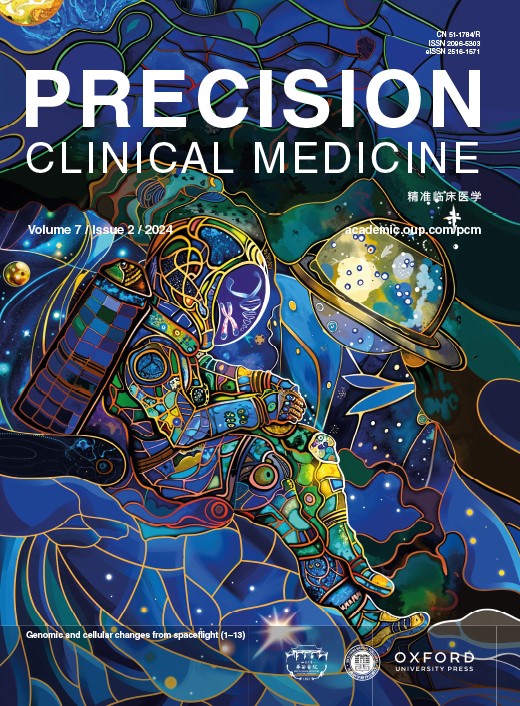A novel immunogenomic signature to predict prognosis and reveal immune infiltration characteristics in pancreatic ductal adenocarcinoma
IF 5.1
4区 医学
Q1 MEDICINE, RESEARCH & EXPERIMENTAL
引用次数: 2
Abstract
Abstract Background The immune response in the tumor microenvironment (TME) plays a crucial role in cancer progression and recurrence. We aimed to develop an immune-related gene (IRG) signature to improve prognostic predictive power and reveal the immune infiltration characteristics of pancreatic ductal adenocarcinoma (PDAC). Methods The Cancer Genome Atlas (TCGA) PDAC was used to construct a prognostic model as a training cohort. The International Cancer Genome Consortium (ICGC) and the Gene Expression Omnibus (GEO) databases were set as validation datasets. Prognostic genes were screened by using univariate Cox regression. Then, a novel optimal prognostic model was developed by using least absolute shrinkage and selection operator (LASSO) Cox regression. Cell type identification by estimating the relative subsets of RNA transcripts (CIBERSORT) and estimation of stromal and immune cells in malignant tumors using expression data (ESTIMATE) algorithms were used to characterize tumor immune infiltrating patterns. The tumor immune dysfunction and exclusion (TIDE) algorithm was used to predict immunotherapy responsiveness. Results A prognostic signature based on five IRGs (MET, ERAP2, IL20RB, EREG, and SHC2) was constructed in TCGA-PDAC and comprehensively validated in ICGC and GEO cohorts. Multivariate Cox regression analysis demonstrated that this signature had an independent prognostic value. The area under the curve (AUC) values of the receiver operating characteristic (ROC) curve at 1, 3, and 5 years of survival were 0.724, 0.702, and 0.776, respectively. We further demonstrated that our signature has better prognostic performance than recently published ones and is superior to traditional clinical factors such as grade and tumor node metastasis classification (TNM) stage in predicting survival. Moreover, we found higher abundance of CD8+ T cells and lower M2-like macrophages in the low-risk group of TCGA-PDAC, and predicted a higher proportion of immunotherapeutic responders in the low-risk group. Conclusions We constructed an optimal prognostic model which had independent prognostic value and was comprehensively validated in external PDAC databases. Additionally, this five-genes signature could predict immune infiltration characteristics. Moreover, the signature helped stratify PDAC patients who might be more responsive to immunotherapy.一种新的免疫基因组特征预测胰腺导管腺癌的预后并揭示免疫浸润特征
肿瘤微环境中的免疫反应(tumor microenvironment, TME)在肿瘤的进展和复发中起着至关重要的作用。我们旨在建立免疫相关基因(IRG)信号来提高预后预测能力,揭示胰腺导管腺癌(PDAC)的免疫浸润特征。方法采用肿瘤基因组图谱(TCGA) PDAC构建预后模型作为训练队列。采用国际癌症基因组联盟(ICGC)和基因表达综合数据库(GEO)作为验证数据集。采用单因素Cox回归筛选预后基因。然后,利用最小绝对收缩和选择算子(LASSO) Cox回归建立了一种新的最优预后模型。通过估计RNA转录物的相对亚群(CIBERSORT)来鉴定细胞类型,并使用表达数据(ESTIMATE)算法来估计恶性肿瘤中的基质和免疫细胞,以表征肿瘤免疫浸润模式。采用肿瘤免疫功能障碍和排斥(TIDE)算法预测免疫治疗反应性。结果在TCGA-PDAC中构建了基于5个IRGs (MET、ERAP2、IL20RB、EREG和SHC2)的预后特征,并在ICGC和GEO队列中得到了全面验证。多变量Cox回归分析表明,该特征具有独立的预后价值。1、3、5年生存率时受试者工作特征(ROC)曲线下面积(AUC)值分别为0.724、0.702、0.776。我们进一步证明,我们的标记比最近发表的标记具有更好的预后性能,并且优于传统的临床因素,如肿瘤分级和肿瘤淋巴结转移分类(TNM)分期来预测生存。此外,我们发现TCGA-PDAC低危组CD8+ T细胞丰度更高,m2样巨噬细胞更低,并预测低危组免疫治疗应答者比例更高。结论构建了具有独立预后价值的最佳预后模型,并在外部PDAC数据库中得到了全面验证。此外,这五个基因特征可以预测免疫浸润特征。此外,该特征有助于对PDAC患者进行分层,这些患者可能对免疫治疗更有反应。
本文章由计算机程序翻译,如有差异,请以英文原文为准。
求助全文
约1分钟内获得全文
求助全文
来源期刊

Precision Clinical Medicine
MEDICINE, RESEARCH & EXPERIMENTAL-
CiteScore
10.80
自引率
0.00%
发文量
26
审稿时长
5 weeks
期刊介绍:
Precision Clinical Medicine (PCM) is an international, peer-reviewed, open access journal that provides timely publication of original research articles, case reports, reviews, editorials, and perspectives across the spectrum of precision medicine. The journal's mission is to deliver new theories, methods, and evidence that enhance disease diagnosis, treatment, prevention, and prognosis, thereby establishing a vital communication platform for clinicians and researchers that has the potential to transform medical practice. PCM encompasses all facets of precision medicine, which involves personalized approaches to diagnosis, treatment, and prevention, tailored to individual patients or patient subgroups based on their unique genetic, phenotypic, or psychosocial profiles. The clinical conditions addressed by the journal include a wide range of areas such as cancer, infectious diseases, inherited diseases, complex diseases, and rare diseases.
 求助内容:
求助内容: 应助结果提醒方式:
应助结果提醒方式:


